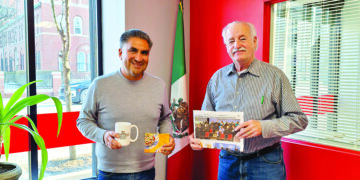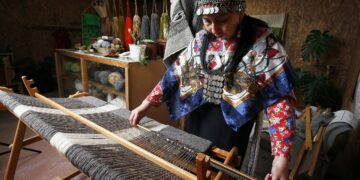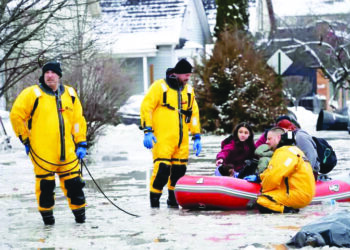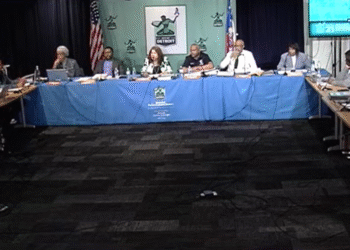Henry John “Hank” Aguirre was an imposing figure on the Tiger Stadium mound. The tall, lanky southpaw would stare in at the batter facing him and get him out with a broad array of dazzling pitches.
He was in the Detroit Tigers’ bullpen as a relief pitcher in 1962 when he was pressed into the starter’s role due to an injured teammate. He took advantage of the opportunity and notched the league’s lowest ERA. Aguirre was unflappable on the mound, as he mowed down hitters and earned a spot on the MLB All-Star Game that season.
One favorite story: When he was a rookie, Hank struck out Boston Red Sox legend Ted Williams, and then asked Williams to autograph the ball. Williams, who was not known to do things like that, agreed. But the next time he faced Aguirre, Williams blasted the first pitch for a home run and told Aguirre to get the ball and he would autograph it as well.

Aguirre spent 16 seasons in the majors, pitching for four teams. He played for the Tigers from 1958 to 1967. He was considered a good teammate and a very determined player. Aguirre later served as a coach with the Chicago Cubs, serving as an effective buffer between players, the media, and mercurial manager Leo Durocher.
Launching a Minority Business
Aguirre took the same no-nonsense approach to business after he retired from baseball. He started Mexican Industries in Southwest Detroit in 1979 at the urging of Volkswagen of America executive Jack Masterson and attorney John Noonan, who saw the opportunity afforded by minority-preference automotive part sourcing and Hank’s obvious leadership skills. Aguirre took out a mortgage on his home and, with an investment from his former teammate Bill Freehan, opened shop. The company’s name referred to both the Mexicantown neighborhood that was adjacent to the ballpark and the company’s heavily Latino workforce.
The company manufactured automotive textile products, including steering wheel covers, seat covers, air bags, and covers for spare tires, with most workers doing cutting and/or sewing.
Although the firm had humble beginnings, the company grew into a juggernaut, boasting 900 Detroit workers, and stood as an example of how to employ local people living within walking distance of the company and still compete with the big boys for contracts. Revenue climbed past $150 million by the late 1980s, fueled by contracts with GM, Chrysler, Ford, and a number of their Tier One suppliers.
Honoring Hank
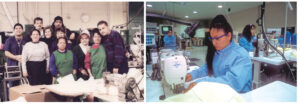
In 1987, the U.S. Hispanic Chamber of Commerce named Aguirre Businessman of the Year. The Chamber’s honor wasn’t just for Mexican Industries’ performance, but also for Hank’s work ethic and his commitment to the local community. He had worked for his father’s tortilla company as a teen, making deliveries on foot starting at 4:00 AM before school. After starting Mexican Industries, he sponsored baseball, basketball, and soccer leagues for employees from the company’s five buildings. When an employee was short on bill-paying money or needed a little extra cash for Christmas presents or rent, he gave advances with easy low-interest repayment plans; such payments were kept quiet to make sure employees were not embarrassed by having had to ask for the help.
At Mexican Industries, Aguirre was not content to run things from the corner office. He regularly walked the shop floors of his operations. He knew the first names of the people he stopped to chat with, remembered their children’s birthdays, and gave them Christmas ornaments made by another of his businesses.
Not surprisingly, many of his workers liked and looked up to Aguirre. Some saw him almost as a father figure, so Aguirre enjoyed a good reputation on the Southwest side and the broader Detroit community. Many of the company’s hires were residents new to the US and grateful for employment. The Michigan Minority Business Hall of Fame tribute video bit.ly/HankAguirreVideo demonstrates the extremely high regard in which Aguirre was held in the neighborhood, region, and industry.
Like many entrepreneurs, Aguirre was convinced that he knew what was best for the company and its employees. So, in the early 1990s, when the UAW first tried to organize Mexican Industries’ workers, Hank made his opposition known in no uncertain terms. That no doubt played a role in the 1993-95 UAW campaign that ended in defeat for the union.
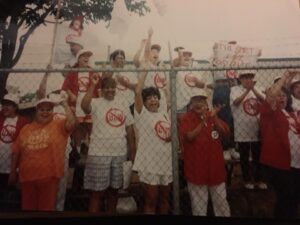
Stormy Weather
When Hank’s four children assumed the leadership roles after he died of cancer in 1994, the company had diversified to include new customers such as Lear, a Tier One auto supplier that manufactured seats, headliners, and in some cases full automotive interiors for Detroit’s Big Three. In 1998 they formed Aguirre Safety Technologies, a joint venture with TRW to do the cut-and-sew work for side impact airbags.
But, even as the company’s revenues climbed toward $190 million, storm clouds began to appear on the horizon. Timely payments were rare in the early 1990s, even for many of the best-performing suppliers. The company lost some key contracts while other firms didn’t fulfill the original terms of contracts because of recurring quality deficiencies. Profit margins, always thin, shrank further and the company had to assume more debt. In the late 1990s, three different CEOs were at the helm of Mexican Industries.
Other pressures, most of them inherent to the nature of auto supplier operations, also were factors. First, the “cut-and-sew” work at Mexican Industries was very labor-intensive and in direct competition with low-wage producers in Mexico, pushing down what its customers would pay. Even after awarding contracts, automakers usually demanded yearly price cuts as a requirement for keeping the business. Second, while automakers had committed to sourcing more of their components from minority- and woman-owned enterprises, performing well was a challenge for firms whose profit margins were so thin. Joint ventures often helped them to upgrade operations to achieve more predictable quality, but profits were seldom sufficient to allow them to automate their processes enough to boost productivity.
As a consequence, most jobs at Mexican Industries – and at many other labor-intensive minority suppliers – would remain demanding, repetitive, and low-paying.
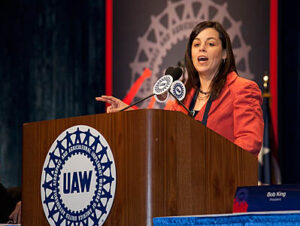
The Union
Five years after Hank Aguirre’s death, the company seemed to have little option but to push workers harder in the face of the challenges associated with shipping each day’s production and mounting financial pressure. The workforce, which was heavily female, seemed to have had enough. Seeking improvements in wages and working conditions, there was renewed interest in a new UAW campaign, despite the firm’s threats to shut down the company if it was unionized.
The effort was led by then 26–year-old Cindy Estrada. Her father owned a bar in the neighborhood and the United Farm workers office was next door. She had been active in the United Farm Worker’s Grape boycott. Her uncle was a Latin American Council for Labor Advancement (LACLA) activist. Estrada established a strong rapport with the company’s workforce and was not afraid to challenge the firm’s reputation as a benevolent employer with a reputation for caring about its employees and the community. The campaign augmented its ranks during the campaign’s final phase by engaging Spanish language speaking officials from other UAW locals. Organizers met with workers in their homes and reached out whenever the opportunity presented itself. Estrada’s success propelled her up the ranks in the UAW’s Organizing Department, and she later became the UAW’s first Latina vice-president, retiring in 2023.
The UAW carried all four of Mexican Industries’ production facilities and captured 58% of the vote. The UAW brought in Ford and Visteon to try to broaden the company’s customer base and worked behind the scenes to help keep the business solvent.
The Firm’s Final Chapter
When Mexican Industries failed, some diehard anti-union people sought to blame the UAW. But even local bankers queried about the company’s closure found the idea that a mere 25-cent raise had doomed Mexican Industries not particularly credible. That raise cost the company $676,000 a year in 2000, the only full year it was in effect; that was a pittance compared to the $22.6 million that Mexican Industries owed its unsecured creditors at the time.
The true scope of the company’s troubles was kept from public view. Both management and the union believed that in order to save the firm and its jobs, new contracts had to be landed, short-term financing had to be secured, or a new owner found. They feared these efforts would be jeopardized if bankers and workers had a clearer view of the company’s dire circumstances.
However, when it became known that the healthcare payments were being deducted from workers’ paychecks, despite the benefit having already been terminated, the UAW sued. The union also alleged that the company had withheld vacation pay and that, when it closed, had failed to give its workers the legally required 60-day notice. Mexican Industries shuttered its doors for good in 2001, bringing to an end one of the nation’s first major minority-owned auto suppliers.
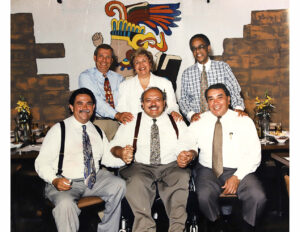
y Facundo Bravo, de Uni Boring Co. Fila de atrás: Harold Kutner, de Compras Mundiales de GM; Carmen Muñoz, de Munoz Machine Products, Inc.; y William C. Brooks, de Relaciones Corporativas de GM. La cele- bración tuvo lugar en el restaurante El Zócalo (ahora Taquería El Rey) en el Barrio Mexicano.
A Neighborhood Legacy
The story is a sad one, especially for the workers who made their living at the company. But the full legacy of Mexican Industries is not only one of failure. Aguirre was a friend and mentor to numerous people in the industry. One of them was Frank Venegas, owner of Ideal Steel who had founded his company in Hamburg, Michigan, 50 miles northwest of Detroit. Aguirre felt that Ideal should have been located in Detroit and was not shy about letting Frank know that.
At Aguirre’s funeral, Venegas and others decided to honor their friend’s memory and made plans to develop the Hispanic Manufacturing Center (HMC) in the newly created Clark Street Technology Park. The HMCV partnership of the Ideal Group, Gonzalez Design Engineering, Munoz Machine Products and Uni Boring was established in one of the earliest Detroit Renaissance Zones in 1995. They were attracted to the former site of Cadillac Clark assembly plant, just south of Michigan Avenue, because of the tax credits offered through a partnership involving Detroit, Wayne County, the State of Michigan, and the federal government.
The life of the HMC was short-lived. However, the Ideal Group, having initially moved into one of Aguirre’s buildings before centering its operations at the Technology Park, diversified its products and expanded. It has emerged as one of the most successful Latino-owned businesses in Michigan and a champion for the neighborhood.
This article has benefitted from economist Dan Luria’s insights into the challenges facing auto suppliers during this period.
Developed with the Support from the Southwest Detroit Business Association
The Michigan Minority Business Hall of Fame tribute video “Hank Aguirre – Tall in Stature… Big in Heart” produced by the Michigan Minority Supplier Council demonstrates the extremely high regard in which Aguirre was held in the neighborhood, region, and industry. This URL allows access to it: https://www.youtube.com/watch?v=BQjNvnO1928
The MotorCities National Heritage Area’s 2021 Women’s History Month Interview with Cindy Estrada can be accessed at: https://www.youtube.com/watch?v=-ot-La78pZ0
Mexican Industries de Hank Aguirre
Henry John “Hank” Aguirre fue una figura imponente en el montículo del Estadio de los Tigers. Zurdo, alto y desgarbado, miraba fijamente al bateador que tenía enfrente y lo ponchaba con unos lanzamientos deslumbrantes.
Formó parte del bullpen de los Detroit Tigers como relevista en 1962, cuando se vio obligado a asumir el rol de abridor debido a la lesión de un compañero. Aprovechó la oportunidad y registró la efectividad más baja de la liga. Aguirre se mantuvo imperturbable en el montículo, aniquilando bateadores y ganándose un lugar en el Juego de Estrellas de la MLB esa temporada.
La anécdota favorita: Cuando era novato, Hank ponchó a la leyenda de los Medias Rojas – Boston Red Sox, Ted Williams, y luego le pidió a Williams que autografiara la pelota. Williams, quien no era conocido por hacer ese tipo de cosas, accedió. Pero la siguiente vez que se enfrentó a Aguirre, Williams conectó un jonrón con el primer lanzamiento y le dijo a Aguirre que tomara la pelota y que él también la autografiaría.

Aguirre pasó 16 temporadas en las Grandes Ligas, lanzando para cuatro equipos. Jugó para los Tigres de 1958 a 1967. Era considerado un buen compañero de equipo y un jugador muy decidido. Posteriormente, Aguirre se desempeñó como entrenador de los Cachorros de Chicago – Chicago Cubs, sirviendo como un eficaz intermediario entre los jugadores, los medios de comunicación y el voluble mánager Leo Durocher.
Lanzó un negocio minoritario
Aguirre adoptó el mismo enfoque sensato en los negocios después de retirarse del béisbol. Fundó Mexican Industries en el suroeste de Detroit en 1979 a instancias del ejecutivo de Volkswagen of America, Jack Masterson, y del abogado John Noonan, quienes vieron la oportunidad que ofrecía el abastecimiento de piezas automotrices para minorías y las evidentes habilidades de liderazgo de Hank. Aguirre hipotecó su casa y, con una inversión de su excompañero de equipo Bill Freehan, abrió un taller. El nombre de la empresa hacía referencia tanto al barrio Mexicantown, adyacente al estadio, como a su fuerza laboral, mayoritariamente latina.
La empresa fabricaba productos textiles para automóviles, como fundas para volantes, fundas para asientos, bolsas de aire y fundas para llantas de refacción, y la mayoría de sus trabajadores se dedicaban al corte y/o la costura.
Aunque la empresa tuvo un comienzo humilde, se convirtió en un gigante, con 900 trabajadores en Detroit, y fue un ejemplo de cómo emplear a personas locales que vivían a poca distancia de la empresa y, al mismo tiempo, competir con las grandes empresas por contratos. Los ingresos superaron los 150 millones de dólares a finales de la década de 1980, impulsados por contratos con GM, Chrysler, Ford y varios de sus proveedores de primer nivel.

Homenaje a Hank
En 1987, la Cámara de Comercio Hispana de Estados Unidos nombró a Aguirre Empresario del Año. El reconocimiento de la Cámara no solo se debía al desempeño de Mexican Industries, sino también a la ética de trabajo de Hank y su compromiso con la comunidad local. De adolescente, trabajó en la empresa de tortillas de su padre, haciendo repartos a pie desde las 4:00 a. m. antes de ir a la escuela. Tras fundar Mexican Industries, patrocinó ligas de béisbol, baloncesto y fútbol para los empleados de los cinco edificios de la empresa. Cuando un empleado andaba corto de dinero para pagar facturas o necesitaba un extra para los regalos de Navidad o el alquiler, les daba anticipos con planes de pago fáciles y con bajos intereses; estos pagos se mantenían en secreto para que los empleados no se sintieran avergonzados por haber tenido que pedir ayuda.
En Mexican Industries, Aguirre no se conformaba con dirigir desde la oficina. Recorría regularmente las plantas de producción. Sabía los nombres de pila de las personas con las que se detenía a charlar, recordaba los cumpleaños de sus hijos y les regalaba adornos navideños hechos por otro de sus negocios.
No era de extrañar que muchos de sus trabajadores lo apreciaran y admiraran. Algunos lo veían casi como una figura paterna, por lo que Aguirre gozaba de buena reputación en el suroeste y en la comunidad de Detroit en general. Muchos de los empleados de la empresa eran residentes recién llegados a Estados Unidos y agradecidos por el empleo. El video de homenaje al Salón de la Fama de las Empresas Minoritarias de Michigan (bit.ly/HankAguirreVideo) demuestra la gran estima que se tenía a Aguirre en el vecindario, la región y la industria.
Como muchos empresarios, Aguirre estaba convencido de saber qué era lo mejor para la empresa y sus empleados. Así, a principios de la década de 1990, cuando el UAW intentó por primera vez organizar a los trabajadores de Mexican Industries, Hank expresó su oposición sin ambages. Esto sin duda influyó en la campaña del UAW de 1993-95 que terminó en derrota para el sindicato.

Tiempo Tormentoso
Cuando los cuatro hijos de Hank asumieron la dirección tras su fallecimiento de cáncer en 1994, la empresa se había diversificado para incluir nuevos clientes como Lear, un proveedor de automóviles de primer nivel que fabricaba asientos, tapizados de techo y, en algunos casos, interiores completos para las Tres Grandes de Detroit. En 1998, formaron Aguirre Safety Technologies, una empresa conjunta con TRW para realizar el trabajo de corte y confección de bolsas de aire de impacto lateral.
Pero, incluso cuando los ingresos de la compañía ascendían a 190 millones de dólares, comenzaron a aparecer nubarrones en el horizonte. Los pagos puntuales eran poco frecuentes a principios de la década de 1990, incluso para Muchos de los proveedores con mejor desempeño. La empresa perdió algunos contratos clave, mientras que otras firmas incumplieron los términos originales debido a deficiencias de calidad recurrentes. Los márgenes de ganancia, siempre bajos, se redujeron aún más y la empresa tuvo que asumir más deuda. A finales de la década de 1990, tres directores ejecutivos diferentes dirigían Mexican Industries.
Otras presiones inherentes a la naturaleza de las operaciones de los proveedores automotrices, también fueron factores. En primer lugar, el trabajo de “corte y confección” en Mexican Industries requería mucha mano de obra y competía directamente con productores de bajos salarios en México, lo que presionaba a la baja los precios que sus clientes estaban dispuestos a pagar. Incluso después de adjudicar los contratos, los fabricantes de automóviles solían exigir reducciones de precios anuales como requisito para mantener el negocio. En segundo lugar, si bien los fabricantes de automóviles se habían comprometido a obtener más componentes de empresas propiedad de minorías y mujeres, obtener un buen desempeño era un desafío para las empresas cuyos márgenes de ganancia eran tan bajos. Las empresas conjuntas a menudo les ayudaban a optimizar sus operaciones para lograr una calidad más predecible, pero las ganancias rara vez les permitían automatizar sus procesos lo suficiente como para aumentar la productividad.
Como consecuencia, la mayoría de los empleos en Mexican Industries, y de muchos otros proveedores minoritarios con alta demanda de mano de obra, seguían siendo exigentes, repetitivos y mal pagados.

El sindicato
Cinco años después de la muerte de Hank Aguirre, la empresa parecía no tener otra opción que exigir más a los trabajadores ante los desafíos asociados con el envío de la producción diaria y la creciente presión financiera. La fuerza laboral, predominantemente femenina, parecía haber tenido suficiente. En busca de mejoras salariales y laborales, se renovó el interés en una nueva campaña del UAW, a pesar de las amenazas de la empresa de cerrarla si se sindicalizaba.
La iniciativa fue liderada por Cindy Estrada, que entonces tenía 26 años. Su padre era dueño de un bar en el barrio y la oficina de United Farm Workers estaba al lado. Había participado activamente en el boicot a la producción de uvas de United Farm Worker´s Grape. Su tío era activista del Consejo Latinoamericano para el Avance Laboral (Latin American Council for Labor Advancement LACLA). Estrada estableció una sólida relación con los trabajadores de la empresa y no dudó en desafiar la reputación de la empresa como empleador benévolo y comprometido con sus empleados y la comunidad. La campaña aumentó sus filas durante la fase final, involucrando a funcionarios hispanohablantes de otras secciones locales del UAW. Los organizadores se reunieron con los trabajadores en sus hogares y los contactaron siempre que se presentó la oportunidad. El éxito de Estrada la impulsó a ascender en el Departamento de Organización del UAW, y posteriormente se convirtió en la primera vicepresidenta latina de la organización, jubilándose en 2023.
El UAW controlaba las cuatro plantas de producción de Mexican Industries y obtuvo el 58% de los votos. El UAW contrató a Ford y Visteon para intentar ampliar la base de clientes de la empresa y trabajó entre bastidores para ayudar a mantener la solvencia del negocio.
El capítulo final de la empresa
Cuando Mexican Industries quebró, algunos antisindicales acérrimos intentaron culpar al UAW. Pero incluso los banqueros locales, consultados sobre el cierre de la empresa, consideraron poco creíble la idea de que un simple aumento de 25 centavos la hubiera condenado al fracaso. Ese aumento le costó a la empresa 676.000 dólares anuales en 2000, el único año completo de vigencia; una miseria en comparación con los 22,6 millones de dólares que Mexican Industries debía a sus acreedores quirografarios en ese momento.
El verdadero alcance de los problemas de la empresa se ocultó al público. Tanto la dirección como el sindicato creían que, para salvar la empresa y sus empleos, era necesario conseguir nuevos contratos, financiación a corto plazo o encontrar un nuevo propietario. Temían que estos esfuerzos se vieran comprometidos si los banqueros y los trabajadores tenían una visión más clara de la grave situación de la empresa. Sin embargo, cuando se supo que los pagos de seguro médico se estaban deduciendo de los salarios de los trabajadores, a pesar de que el beneficio ya había sido cancelado, el UAW presentó una demanda. El sindicato también alegó que la empresa había retenido el pago de vacaciones y que, al cerrar, no había notificado a sus trabajadores con el preaviso legal de 60 días. Mexican Industries cerró definitivamente en 2001, poniendo fin a uno de los primeros grandes proveedores de automóviles propiedad de minorías del país.

y Facundo Bravo, de Uni Boring Co. Fila de atrás: Harold Kutner, de Compras Mundiales de GM; Carmen Muñoz, de Munoz Machine Products, Inc.; y William C. Brooks, de Relaciones Corporativas de GM. La cele- bración tuvo lugar en el restaurante El Zócalo (ahora Taquería El Rey) en el Barrio Mexicano.
Un legado vecinal
La historia es triste, especialmente para los trabajadores que se ganaban la vida en la empresa. Pero el legado completo de Mexican Industries no es solo un fracaso. Aguirre fue amigo y mentor de numerosas personas en la industria. Uno de ellos fue Frank Venegas, propietario de Ideal Steel, quien fundó su empresa en Hamburg, Michigan, a 80 kilómetros al noroeste de Detroit. Aguirre creía que Ideal debería haber estado ubicada en Detroit y no dudó en hacérselo saber a Frank.
En el funeral de Aguirre, Venegas y otros decidieron honrar la memoria de su amigo e hicieron planes para desarrollar el Centro de Manufactura Hispana (Hispanic Manufacturing Center HMC) en el recién creado Parque Tecnológico – Clark Street Technology Park. La alianza entre el HMCV e Ideal Group, Gonzalez Design Engineering, Munoz Machine Products y Uni Boring se establecieron en una de las primeras Zonas Renacentistas de Detroit en 1995. Se sintieron atraídos por la antigua sede de la planta de ensamblaje de Cadillac Clark, justo al sur de la Avenida Michigan, debido a los créditos fiscales ofrecidos a través de una asociación entre Detroit, el Condado de Wayne, el Estado de Michigan y el gobierno federal.
La existencia de HMC fue breve. Sin embargo, Ideal Group, tras haberse mudado inicialmente a uno de los edificios de Aguirre antes de centrar sus operaciones en el Parque Tecnológico, diversificó sus productos y se expandió. Se ha consolidado como una de las empresas de propiedad latina más exitosas de Michigan y un referente para el vecindario.
Este artículo se ha beneficiado de las perspectivas del economista Dan Luria sobre los desafíos que enfrentaron los proveedores de automóviles durante este período.














